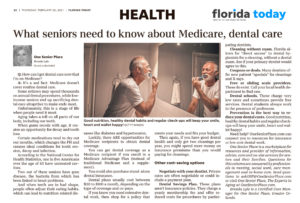
 Brenda Lyle – Special to FLORIDA TODAY
Brenda Lyle – Special to FLORIDA TODAY
Reader question: How can I get dental care now that I’m on Medicare?
Answer: It’s a sad fact: Medicare doesn’t cover routine dental care.
Some retirees may spend thousands on annual dental procedures, while low-income seniors end up sacrificing dental care altogether to make ends meet.
 Unfortunately, this is a stage of life when people need it most.
Unfortunately, this is a stage of life when people need it most.
Aging takes a toll on all parts of our body, including our teeth.
When gums recede with age, it creates an opportunity for decay and tooth loss.
Certain medications tend to dry out our mouths, which changes the PH and creates ideal conditions for tooth erosion, decay and infection.
According to the National Center for Health Statistics, one in five Americans over the age of 65 have untreated cavities.
Two out of three seniors have gum disease, the bacteria from which has been linked to heart problems.
And when teeth are in bad shape, people often adjust their eating habits, which can lead to nutrition-related diseases like diabetes and hypertension.
Luckily, there ARE opportunities for Medicare recipients to obtain dental coverage.
You can get dental coverage as a Medicare recipient if you enroll in a Medicare Advantage Plan (instead of traditional Medicare and a supplement).
You could also purchase stand-alone dental insurance.
Dental plans usually cost between $20 to $100 a month, depending on the type of coverage and co-pays.
If you know you need extensive dental work, then shop for a policy that meets your needs and fits your budget.
Then again, if you have good dental health and only get two cleanings per year, you might spend more money on insurance premiums than you would paying for cleanings.
Other cost-saving options
Negotiate with your dentist. Private rates are often negotiable or could include a payment plan.
Dental Savings Plan. These plans aren’t insurance policies. They charge a yearly membership fee and offer reduced costs for procedures by participating dentists.
Cleaning without exam. Florida allows for “direct access” to dental hygienists for a cleaning, without a dental exam. See if your primary dentist would agree to this.
Coupons or deals. Many dentists offer new patient “specials” for cleanings and X-rays.
Free or sliding scale providers. These do exist. Call your local health department to find one.
Dental schools. These charge very low rates and sometimes provide free services. Dental students always work in the presence of professors.
Prevention is the best way to reduce your dental costs. Good nutrition, healthy dental habits and regular check-ups will keep your smile, heart and wallet happy!
Need help? OneSeniorPlace.com can connect you to resources for insurance or low cost dental work.
##
One Senior Place is a marketplace for resources and provider of information, advice, care and on-site services for seniors and their families. Questions for this column are answered by professionals in nursing, social work, care management and in-home care. To submit a question, send an email to askOSP@OneSeniorPlace.com or visit One Senior Place, The Experts in Aging at OneSeniorPlace.com.
Brenda Lyle is a Certified Care Manager for One Senior Place, Greater Orlando


